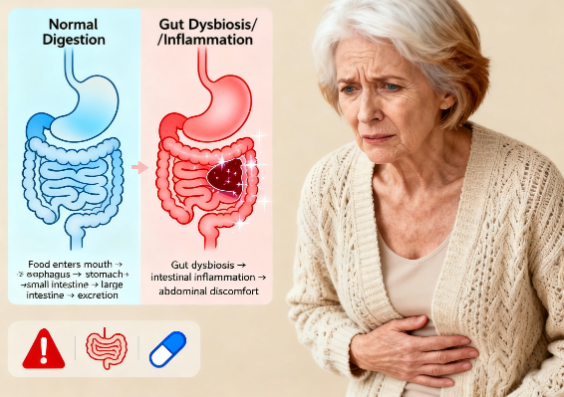
Why Your Bloating Isn’t Just Digestion… See More
It happens after almost every meal now—that uncomfortable, tight feeling in your abdomen. Your pants fit perfectly in the morning but feel uncomfortably tight by afternoon. You blame the beans, the broccoli, or “something you ate.” Everyone experiences occasional bloating, right? What if that persistent bloating isn’t just about digestion? What if it’s your body’s way of signaling something more significant?
For many adults over 50, bloating has become such a regular occurrence that they accept it as normal. But medical research reveals that persistent bloating—especially when accompanied by other symptoms—can be an important warning sign worth paying attention to.
When Bloating Is More Than Just Gas
While occasional bloating after a large meal is normal, persistent or severe bloating that occurs frequently might indicate:
1. Ovarian Cancer (For Women)
Persistent bloating that doesn’t come and go but remains constant—often described as “feeling full all the time”—is one of the key early symptoms of ovarian cancer. When accompanied by pelvic pain, difficulty eating, and urinary changes, it warrants immediate medical attention.
2. Celiac Disease
This autoimmune disorder, where gluten damages the small intestine, can develop at any age. Many adults are diagnosed in their 50s and 60s after years of unexplained digestive issues, including chronic bloating.
3. Small Intestinal Bacterial Overgrowth (SIBO)
As we age, changes in digestive motility and acid production can allow bacteria to overgrow in the small intestine, causing persistent bloating, gas, and discomfort.
4. Pancreatic Issues
When the pancreas doesn’t produce enough digestive enzymes, food isn’t properly broken down, leading to fermentation, gas production, and bloating.
5. Heart Failure
Surprisingly, fluid retention due to heart failure can cause abdominal bloating and discomfort, often accompanied by swelling in the legs and shortness of breath.
6. Liver Disease
A struggling liver can lead to fluid accumulation in the abdomen (ascites), creating significant bloating and discomfort.
The Aging Digestive System Factor
As we enter our 50s and beyond, several natural changes make bloating more common:
- Slower digestion and reduced motility
- Decreased production of digestive enzymes
- Changes in gut bacteria composition
- Increased medication use that affects digestion
- Reduced physical activity affecting bowel function
What Your Bloating Is Trying to Tell You
Your body might be communicating through bloating:
- “I’m not processing dairy well anymore” (lactose intolerance often develops with age)
- “These medications are disrupting my gut balance” (many common medications affect digestion)
- “I’m not moving enough” (physical activity stimulates digestion)
- “I’m dehydrated” (paradoxically, dehydration can cause water retention)
- “I’m eating too quickly” (swallowed air contributes significantly to bloating)
When to See Your Doctor
Schedule an appointment if your bloating:
- Is persistent (lasting more than three weeks)
- Is severe or painful
- Is accompanied by weight loss
- Comes with changes in bowel habits
- Includes blood in stool
- Occurs with nausea or vomiting
- Is accompanied by fever
Finding Relief and Answers
While you investigate the cause, these strategies often help:
- Eat mindfully: Chew thoroughly, eat slowly, and avoid talking while eating
- Identify triggers: Keep a food diary to spot patterns
- Stay active: Regular movement supports digestion
- Try peppermint: Peppermint tea or oil can relieve gas and bloating
- Consider probiotics: These can help rebalance gut bacteria
- Stay hydrated: Drink water throughout the day
The Bottom Line
That bloated feeling you’ve been dismissing as “just part of getting older” might be more than indigestion. It could be your body’s way of alerting you to conditions that need attention—from food sensitivities to more serious health issues.
Don’t just reach for another antacid and hope it passes. Listen to what your body is telling you. Sometimes the most important health messages come from the most uncomfortable places.